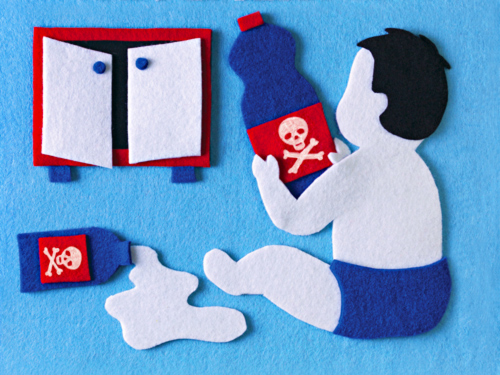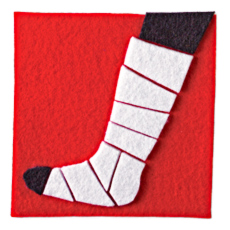
What to do in an emergency
 |
We hope you’ll never need this advice—but if you do, it will get you through those first terrifying moments.
When you’re a parent, you’re also a cook, a chauffeur, a counselor, a tutor, a handyman, a coach, and more. But perhaps the scariest role you’ll have to fill at some point is being an EMT. You know how it goes: One moment your child is playing happily—and the next he’s bleeding, or holding a wrist that’s swelling before your eyes, or screaming after touching the hot pan you thought was totally out of reach.
It’s entirely possible that all of your family’s health emergencies will be minor. But being prepared for the bigger problems, just in case, is important. You don’t actually need to have medical training, of course. What you need to know is how to recognize the following serious situations, the steps you should take right away, and whether you should call your doctor or 911, or go to the E.R.
Head Injuries
The signs After a bump to the head, red flags of a concussion include passing out (even briefly), severe headache, vomiting, confusion, sleepiness, or trouble walking.
What to do immediately Check your child. If she seems to have hurt her neck—which is possible if she fell on her head—or has any weakness or tingling in her arms, keep her still and call 911. If she hit her head at a sports event, she must stop playing at once to avoid a second injury. Also call 911 if she passes out after a fall and has any trouble waking up. Go to an E.R. if she has a severe headache or if she’s confused, much sleepier than usual, stumbling, persistently vomiting, or doing anything else that’s worrisome. Otherwise, still call your doctor for advice.
Severe Allergic Reaction
The signs Your child may break out in hives. Her face and/or lips may swell, and she may cough or breathe with difficulty. Dizziness, vomiting, or diarrhea are also possible.
What to do immediately If there is an epinephrine injector (like an EpiPen) available, use it. Even if she seems better afterward, take her to an E.R. anyway because the effects of the medication can wear off. If she’s having difficulty speaking or breathing, or if she passes out, don’t bother with the E.R.—call 911. No injector? Call 911. Make her comfortable. If you have any Benadryl (diphenhydramine) in the house, give it to your child as you wait for help to arrive.
Chipped or knocked-out Tooth
The signs
In addition to the obvious
dental damage, the area may be red.
What to do immediately
Call your dentist right away, especially if it’s a permanent tooth. If you can’t reach her, go to an E.R. A chipped tooth with an exposed nerve needs to be addressed quickly. Put a knocked-out permanent tooth back in its socket ASAP if your child can hold it in place by biting a paper towel or a clean washcloth. (Rinse the tooth gently if need be. Otherwise, keep it in a container with milk or a bit of saliva.
Choking
The signs
She’s having trouble breathing and may hold her hands to her throat or faint. It can happen while she’s eating or playing, if she put a toy in her mouth.
What to do immediately
Encourage her to cough it up. If the object doesn’t come out, perform the Heimlich maneuver. Stand behind her and reach around her waist; place your fist (thumb in) above her belly button and grab your fist with your other hand. Pull in and up quickly. Do this a few times. If the child can’t speak or passes out, call 911 while someone performs CPR if possible to dislodge the object through chest compressions. (The process differs for a baby; see “5 Things Every Parent Should Know” on page 76.)
Eye Injury
The signs Your child will likely be in a lot of pain and rub or press on his eye(s), which may be red or tearing heavily.
What to do immediately
Call 911 if there’s obvious damage to the eye or if whatever is in it has burned his face too; if he’s having trouble breathing; or if he faints. Don’t force the eye open or flush it if there was trauma from a direct blow or an object. Otherwise, hold it open as best you can and pour saline solution or tap water into it. If he seems fine, call your doctor. Go to the E.R. if he doesn’t.
Nosebleed
The signs
Again, this is an injury that is hard to miss. But most nosebleeds look worse than they are.
What to do immediately Pinch your child’s nose right where the soft part meets the bone, and have him lean forward for at least five minutes. If that doesn’t stop the bleeding, squeeze for another ten to 15 minutes. If it still doesn’t stop, go to the E.R. If your child’s nose bleeds more than once or twice a week, or if he’s having other bleeding or bruising, call your doctor.
Seizure
The signs Your child may suddenly start jerking or stiffening his arms or legs and not respond to you. The signs can also be more subtle—he may stare or look dazed for several seconds,
or his eyes may roll up.
What to do immediately Place him on his side. Try to note the time; most seizures last between two and five minutes. Don’t put anything in his mouth; you don’t need to worry about his biting his tongue. If he’s never had a seizure before, call 911. If he has a seizure disorder, call 911 if he’s having trouble breathing,
if he turns blue, if the seizure lasts for more than five minutes, or if when the seizure has passed he’s extremely sleepy, in pain, unable to breathe well, or just seems different. If he has a seizure disorder and he seems okay (although sleepy) afterward, call your doctor for advice.
Burns
The signs Your child’s skin may be very red
and blistered. A third-degree burn, the worst kind, can appear white or black.
What to do immediately Run his skin under cold water. Call 911 for a significant burn that’s caused by an open flame or electricity, or if your child is acting confused or short of breath. Otherwise, call your doctor right away for advice. If you can’t reach someone within 30 minutes, go to an E.R.

Broken Bone
The signs If the bone is crooked or sticking out, it’s broken. But often it’s less clear. After an injury, if your child is in a lot of pain, has swelling in the injured area, feels light-headed, or throws up, a bone may be broken.
What to do immediately Make him comfortable. Move the affected limb as little as possible. Call 911 if the bone is sticking out or crooked or if he’s in severe pain. If not, go call your doctor for advice or go to the E.R.
Poisoning
The signs Symptoms depend on the poison. They may include burns on the mouth, trouble breathing, sleepiness, and vomiting. Suspect poisoning any time your young child is suddenly acting odd or ill.
What to do immediately
If she’s having trouble breathing or staying awake, call 911. Otherwise call Poison Control at 1-800-222-1222 to find out whether to get medical attention. It’s helpful if you know what she ingested; if possible, have the container handy and be ready to tell the staffer how
much you think your child took and how much she weighs.